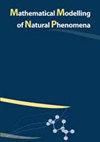Predators as a possible strategy for controlling a {\it Xylella} epidemic?
IF 2.1
4区 数学
Q2 MATHEMATICAL & COMPUTATIONAL BIOLOGY
引用次数: 0
Abstract
In Southern Italy, since 2013, there has been an ongoing Olive Quick Decline Syndrome (OQDS) outbreak, due to the bacterium {\it Xylella fastidiosa}, which has caused a dramatic impact from both socio-economic and environmental points of view. Current agronomic practices are mainly based on uprooting the sick olive trees and their surrounding ones, with later installment of olive cultivars more resistant to the bacterium infection. Unfortunately, both of these practices are having an undesirable impact on the environment and on the economy. Here, a spatially structured mathematical model has been proposed to include a predator {\it Zelus renardii } as a possible biocontrol agent of the {\it Xylella} epidemic. The fact that {\it Z. renardii} has been reported to be a generalist predator implies that its introduction is not an efficient control strategy to eradicate a {\it Xylella} epidemic. Instead, a specialist predator, whenever identified, would lead to the eventual eradication of a {\it Xylella} epidemic. In either cases it has been confirmed that a significant reduction of the weed biomass can lead to the eradication of the vector population, hence of a {\it Xylella} epidemic, independently of the presence of predators.捕食者作为控制木杆菌流行的可能策略?
自2013年以来,在意大利南部,由于快速木霉属细菌,橄榄快速衰退综合征(OQDS)持续爆发,从社会经济和环境角度来看,这造成了巨大影响。目前的农艺措施主要是将生病的橄榄树及其周围的橄榄树连根拔起,后期种植的橄榄品种对细菌感染的抵抗力更强。不幸的是,这两种做法都对环境和经济产生了不良影响。在这里,已经提出了一个空间结构数学模型,以包括捕食者Zelus renardii作为木霉菌流行病的可能生物控制剂。据报道,雷纳尔迪是一种多面手捕食者,这一事实表明,引入雷纳尔蒂并不是根除木霉菌流行的有效控制策略。相反,一旦发现专门的捕食者,就会最终根除木霉菌的流行。在这两种情况下,已经证实,杂草生物量的显著减少可以导致媒介种群的根除,从而导致木霉菌的流行,而与捕食者的存在无关。
本文章由计算机程序翻译,如有差异,请以英文原文为准。
求助全文
约1分钟内获得全文
求助全文
来源期刊

Mathematical Modelling of Natural Phenomena
MATHEMATICAL & COMPUTATIONAL BIOLOGY-MATHEMATICS, INTERDISCIPLINARY APPLICATIONS
CiteScore
5.20
自引率
0.00%
发文量
46
审稿时长
6-12 weeks
期刊介绍:
The Mathematical Modelling of Natural Phenomena (MMNP) is an international research journal, which publishes top-level original and review papers, short communications and proceedings on mathematical modelling in biology, medicine, chemistry, physics, and other areas. The scope of the journal is devoted to mathematical modelling with sufficiently advanced model, and the works studying mainly the existence and stability of stationary points of ODE systems are not considered. The scope of the journal also includes applied mathematics and mathematical analysis in the context of its applications to the real world problems. The journal is essentially functioning on the basis of topical issues representing active areas of research. Each topical issue has its own editorial board. The authors are invited to submit papers to the announced issues or to suggest new issues.
Journal publishes research articles and reviews within the whole field of mathematical modelling, and it will continue to provide information on the latest trends and developments in this ever-expanding subject.
 求助内容:
求助内容: 应助结果提醒方式:
应助结果提醒方式:


